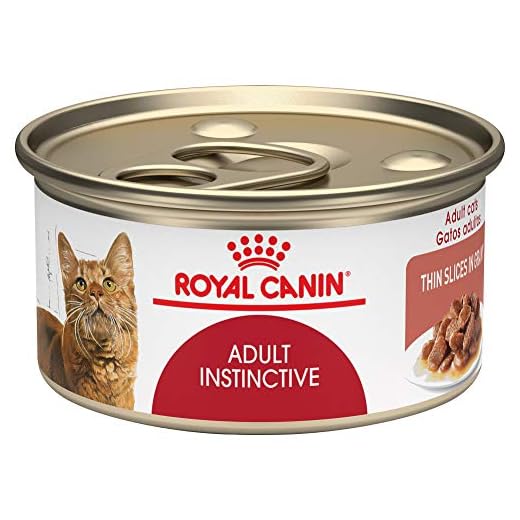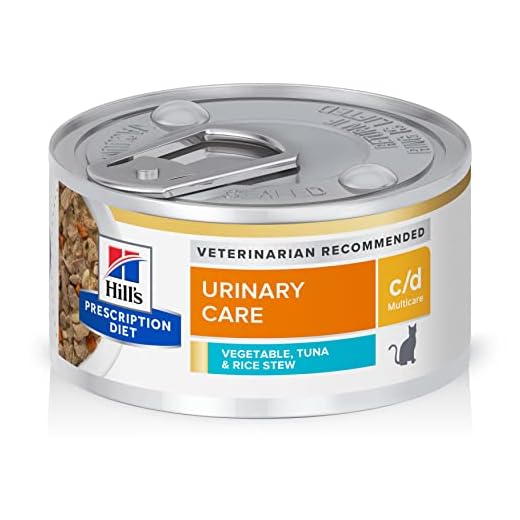



When it comes to feeding your feline friend, canned food can often be a popular choice. Not only does it provide your cat with the necessary hydration, but it is also packed with essential nutrients that are beneficial for their overall health. However, if you find yourself with leftover canned cat food, you might be wondering how long it can be refrigerated for.
The good news is that refrigerating canned cat food is a convenient way to preserve it for future meals. Typically, an opened can of cat food can be safely refrigerated for up to 4-7 days. It’s important to note that this is a general guideline, and factors such as the brand of cat food, the specific ingredients, and the storage conditions can play a role in the shelf life of the opened can.
It’s crucial to ensure that the canned cat food is stored properly in the refrigerator. After opening the can, transfer any unused portion into an airtight container or cover it tightly with plastic wrap. This helps to prevent the food from being exposed to air, which can accelerate spoilage. Additionally, make sure to label the container with the date it was opened, as this will help you keep track of its freshness.
Remember to always use your best judgment when it comes to feeding your cat. If the canned cat food has a strange odor, appearance, or texture, it’s best to err on the side of caution and discard it. Your cat’s health and well-being should always be a top priority, so when in doubt, consult with your veterinarian.
Understanding the Shelf Life
Understanding the shelf life of cat canned food is important to ensure the health and well-being of your feline friend. While canned cat food does have a longer shelf life compared to dry cat food, it is still important to properly store and use it within a certain time frame to maintain its quality and nutritional value.
Factors Affecting Shelf Life
Several factors can affect the shelf life of cat canned food:
- Expiration Date: The expiration date provided on the can should always be considered. It is a good idea to check this date before purchasing or feeding the canned food to your cat.
- Storage Conditions: The way you store the canned cat food can significantly impact its shelf life. It is important to keep the cans in a cool, dry place away from direct sunlight and extreme temperatures.
- Quality of Ingredients: The quality of ingredients used in the canned cat food can also affect its shelf life. High-quality ingredients are less likely to spoil quickly compared to lower-quality ingredients.
Recommended Storage Time
The shelf life of cat canned food can vary depending on the brand and specific product, but in general, it is recommended to use the food within 2-5 days after opening the can. Discard any leftover food that has been sitting in the refrigerator for longer than this time frame.
If you are unsure about the safety of the canned cat food, such as if it has an unusual smell or appearance, it is best to err on the side of caution and not feed it to your cat. Always prioritize the health and well-being of your feline companion.
The Duration for Keeping Canned Cat Food Fresh
Canned cat food is a convenient option for pet owners, but it’s important to properly store it to ensure its freshness and safety for your feline friend. While canned cat food can have a long shelf life, it’s crucial to follow some guidelines to prevent spoilage.
Storing Unopened Canned Cat Food
Unopened canned cat food can be kept in the refrigerator for up to two years. It’s essential to check the packaging for the expiration date before feeding your cat. Always use the oldest cans first to ensure that none of them go past their expiry date. If the can is damaged, bulging, or has a foul odor when opened, discard it immediately.
Storing Opened Canned Cat Food
Once a can of cat food has been opened, it should be covered and refrigerated. The food should be consumed within three to five days to ensure its freshness and quality. Store the opened can in the refrigerator and use airtight covers or transfer the contents to a sealed container to prevent odors from spreading. Make sure to label the container with the date it was opened.
| Storage Guidelines | Unopened Cans | Opened Cans |
|---|---|---|
| Refrigeration Temperature | Below 40°F (4°C) | Below 40°F (4°C) |
| Shelf Life | Up to 2 years | 3 to 5 days |
| Storage Method | Original packaging | Refrigerator with airtight cover or sealed container |
Remember to always use proper hygiene when handling and storing cat food. Wash your hands before and after handling the food, and avoid cross-contamination with other foods or surfaces. If in doubt about the safety of the food, consult with your veterinarian.
Factors Affecting the Shelf Life
There are several factors that can affect the shelf life of canned cat food when refrigerated. It is important to consider these factors to ensure the quality and safety of the food for your feline companion.
1. Storage Temperature
The temperature at which the canned cat food is stored is critical. Refrigeration helps slow down bacterial growth and extends the shelf life. It is recommended to store canned cat food at a temperature between 40°F (4°C) and 45°F (7°C). Avoid exposing the canned food to temperatures above 50°F (10°C) as it can increase the risk of bacterial growth and spoilage.
2. Packaging
The type of packaging used for canned cat food can also impact its shelf life. Cans that are properly sealed and in good condition help prevent air and moisture from entering, which can lead to spoilage. Inspect the cans for any signs of damage or bulging before purchasing or feeding the food to your cat. If the can is dented or damaged, it is advisable to discard it.
3. Quality of Ingredients
The quality of ingredients used in the canned cat food can affect its shelf life. High-quality ingredients and proper processing techniques can result in a longer shelf life. Look for cat foods that use natural preservatives and avoid those with artificial additives and fillers, as they can decrease the shelf life of the food.
Note: It is important to check the expiration date before feeding your cat any canned food, as expired products may pose a risk to your cat’s health.
By considering these factors and proper storage practices, you can ensure the canned cat food remains fresh and safe for a longer duration.
Proper Storage Techniques for Canned Cat Food
Proper storage techniques for canned cat food are essential to maintain its freshness and ensure that it remains safe for your feline companion to consume. Here are some tips for storing canned cat food:
Refrigeration
After opening a can of cat food, refrigeration is the best way to keep it fresh for a longer period. Place the remaining cat food in an airtight container or cover the opened can with plastic wrap or a lid. Make sure to label the container with the date to keep track of its freshness. Refrigerated canned cat food should be consumed within 3-4 days.
Freezing
If you have a surplus of canned cat food, freezing it can be an option to extend its shelf life. Transfer the cat food to a freezer-safe container or resealable bag, and again, remember to label it with the date. Frozen canned cat food can last for up to 2-3 months. When you’re ready to use it, thaw the food in the refrigerator overnight or in a microwave on a defrost setting.
Avoid Temperatures Above Room Temperature
It is crucial to store canned cat food at temperatures below 70°F (21°C). Exposing the food to high temperatures can lead to spoilage and can be harmful to your cat. Be cautious when leaving canned cat food out for an extended period and avoid placing it in direct sunlight or near sources of heat.
Inspect for Damage
Before feeding your cat, always inspect the canned cat food for any signs of damage or bulging cans. Damaged cans can indicate bacterial contamination or spoilage, which can be dangerous for your cat’s health. If you notice any abnormalities, discard the can immediately.
Following these storage techniques will help you keep your canned cat food fresh and safe for your feline companion to consume. Remember to use proper hygiene practices when handling and storing cat food to prevent the risk of contamination. Your cat’s health and well-being should always be a priority!
Signs of Spoiled Canned Cat Food
Canned cat food is a convenient and popular choice for many cat owners. However, it is important to keep an eye out for signs that the canned cat food has spoiled. Here are some signs to look for:
1. Foul Odor
One of the easiest ways to tell if canned cat food has gone bad is by smelling it. If the food has a foul or rancid odor, it is likely spoiling or spoiled. Trust your sense of smell and if in doubt, it is best to err on the side of caution and not feed it to your cat.
2. Unusual Appearance
Another sign that canned cat food may be spoiled is if it has an unusual appearance. Look for any changes in color, texture, or consistency. Mold, discoloration, or an oily film on the surface could indicate that the food is no longer safe for your cat to eat.
Additionally, if you notice any bulging or dented cans, this could be a sign that the food inside has spoiled or that the can has been compromised in some way.
It is important to note that cats have a more sensitive sense of smell and taste than humans, so they may be able to detect spoilage even if it is not readily apparent to us.
If you notice any of these signs of spoiled canned cat food, it is crucial to dispose of it properly and not feed it to your cat. Feeding spoiled food to your cat can lead to digestive issues, illness, or worse.
Always check the expiration date on canned cat food before purchasing it and store it properly to ensure its freshness. It is also a good idea to monitor your cat while they eat to ensure they are not showing any signs of discomfort or illness after consuming the food.
In conclusion, by paying attention to the odor and appearance of canned cat food, you can easily identify if it has spoiled. Your cat’s health and well-being should always be a top priority, so it is vital to be vigilant and only feed them fresh, safe food.
FAQ
How long can cat canned food be refrigerated?
Cat canned food can typically be refrigerated for up to 3-5 days.
Is it safe to feed my cat refrigerated canned food that has been open for a week?
It is not recommended to feed your cat canned food that has been open for a week, as it may have spoiled and could potentially cause digestive issues.
Can I freeze cat canned food to extend its shelf life?
Yes, you can freeze cat canned food to extend its shelf life. Just make sure to transfer it to an airtight container before freezing, and thaw it thoroughly before feeding it to your cat.










